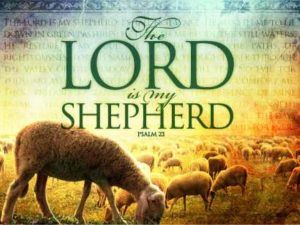 Well, hello again to everyone. Welcome back as we continue in our study of the Church and, most recently, the Metaphors of the Church. A couple weeks ago we looked at the metaphor of the Church as the Body of Christ and Jesus as its Head. Then last week, we started our examination of the metaphor of the Church as a flock of sheep, with Jesus as our Shepherd. We started by opening the Word to Psalm 23 and seeing several aspects of how the shepherd cares for the sheep. We saw that the shepherd provides for all the necessities of the sheep… all those things that are beneficial to their physical and emotional health so that they are wanting for nothing. We saw that the shepherd provides a safe environment…free from fear…where the sheep can feel at ease and at rest. We saw that the shepherd provides needful sustenance, so the sheep are free from hunger and thirst. And we saw that the shepherd is constantly alert for sheep that are in danger…or cast down. The psalmist uses this imagery to illustrate that the Good Shepherd, Jesus, rescues us from spiritual dangers when are souls are “cast down” and unable to find a way back to Him…he is there to “restore our souls”. And finally, last week we saw that the shepherd keeps the sheep on paths that lead them to places of sustenance and safety. As our Shepherd, Jesus leads us along paths of righteousness…to great spiritual truths…that lead us to become like Him.
Well, hello again to everyone. Welcome back as we continue in our study of the Church and, most recently, the Metaphors of the Church. A couple weeks ago we looked at the metaphor of the Church as the Body of Christ and Jesus as its Head. Then last week, we started our examination of the metaphor of the Church as a flock of sheep, with Jesus as our Shepherd. We started by opening the Word to Psalm 23 and seeing several aspects of how the shepherd cares for the sheep. We saw that the shepherd provides for all the necessities of the sheep… all those things that are beneficial to their physical and emotional health so that they are wanting for nothing. We saw that the shepherd provides a safe environment…free from fear…where the sheep can feel at ease and at rest. We saw that the shepherd provides needful sustenance, so the sheep are free from hunger and thirst. And we saw that the shepherd is constantly alert for sheep that are in danger…or cast down. The psalmist uses this imagery to illustrate that the Good Shepherd, Jesus, rescues us from spiritual dangers when are souls are “cast down” and unable to find a way back to Him…he is there to “restore our souls”. And finally, last week we saw that the shepherd keeps the sheep on paths that lead them to places of sustenance and safety. As our Shepherd, Jesus leads us along paths of righteousness…to great spiritual truths…that lead us to become like Him.
We also spent some time looking at the nature of sheep…and found that their nature is much like ours. They are timid and easily frightened. They are prone to wander and are quick to go astray. They are followers, mindlessly mimicking the crowd around them. They establish hierarchies for themselves…the stronger dominating the weaker. And they are utterly unable to provide for themselves or protect themselves. This week we will continue in our study of Psalm 23, picking up in verse 4. But before we do so, let’s look again at the psalm in its entirety.
“1 The LORD is my shepherd, I shall not want. 2 He makes me lie down in green pastures; He leads me beside quiet waters. 3 He restores my soul; He guides me in the paths of righteousness for His name’s sake. 4 Even though I walk through the valley of the shadow of death, I fear no evil, for You are with me; Your rod and Your staff, they comfort me. 5 You prepare a table before me in the presence of my enemies; You have anointed my head with oil; My cup overflows. 6 Surely goodness and loving kindness will follow me all the days of my life, And I will dwell in the house of the LORD forever.”
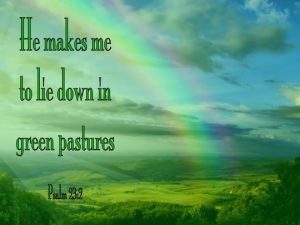 This psalm is descriptive of the typical journey that the shepherd and sheep made each year. After wintering at home, in the early spring the shepherd would lead the sheep to graze upon the new green grasses of the lower pasture land. As temperatures grew hotter and pastures became depleted, the shepherd would lead his flock up to higher pastures using the river and creek valleys to gain access. These valleys tended to be narrow and would also serve as paths for predators seeking water or food as other animals followed the same paths. They could be subject to flash flooding, so the shepherd had to remain alert. These valleys were not tended pastures…they were rough terrain, with steep paths and treacherous footing. Amidst the grasses would be poisonous plants injurious to the sheep. Rockslides would not be uncommon. Dangers would abound.
This psalm is descriptive of the typical journey that the shepherd and sheep made each year. After wintering at home, in the early spring the shepherd would lead the sheep to graze upon the new green grasses of the lower pasture land. As temperatures grew hotter and pastures became depleted, the shepherd would lead his flock up to higher pastures using the river and creek valleys to gain access. These valleys tended to be narrow and would also serve as paths for predators seeking water or food as other animals followed the same paths. They could be subject to flash flooding, so the shepherd had to remain alert. These valleys were not tended pastures…they were rough terrain, with steep paths and treacherous footing. Amidst the grasses would be poisonous plants injurious to the sheep. Rockslides would not be uncommon. Dangers would abound.
This is the setting portrayed in verse 4, “Even though I walk through the valley of the shadow of death, I fear no evil, for You are with me”. The sheep were reliant upon the shepherd to guide and protect them in these “valleys of death”. They were necessary paths to travel; they could not be avoided if the shepherd was committed to tend his flock properly and lead them to higher ground. In the same way, our Great Shepherd protects and leads us when our lives take us through precarious paths as He draws us closer to Him. We, too, have unavoidable journeys…this passage is often used to give comfort when we find ourselves on the unavoidable pathway to our own death. Yet there are other “evils” we face… the rock falls of despair when we encounter deep and unexpected loss… the lovely green plants of sin and deception that appear as nutritious food but instead bring sickness and death. And then there is always Satan, the great predator, seeking to devour us in the midst of the valley. But amongst these dangers, the sheep have no reason to fear, for, as the verse says, “I fear no evil, for You are with me.”
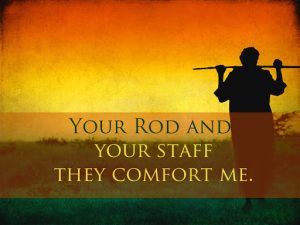 Closely tied to the first half of verse 4 is the second half, “Your rod and Your staff, they comfort me. The shepherd’s rod and staff were instruments of protection and correction…they would be necessary for the shepherd to use in the valleys. The rod was typically a short club and would be used to ward off predators or warn off sheep. It could be thrown by the shepherd with great accuracy, diverting a sheep from dangerous places or actions, or driving off animals or men intent on harm. It could be used by the shepherd to beat the bushes alongside the path to drive off any snakes or creatures that might disturb the sheep. It is a sign of the shepherds authority and protection. And it brings comfort to the sheep as they rest in that authority and protection.
Closely tied to the first half of verse 4 is the second half, “Your rod and Your staff, they comfort me. The shepherd’s rod and staff were instruments of protection and correction…they would be necessary for the shepherd to use in the valleys. The rod was typically a short club and would be used to ward off predators or warn off sheep. It could be thrown by the shepherd with great accuracy, diverting a sheep from dangerous places or actions, or driving off animals or men intent on harm. It could be used by the shepherd to beat the bushes alongside the path to drive off any snakes or creatures that might disturb the sheep. It is a sign of the shepherds authority and protection. And it brings comfort to the sheep as they rest in that authority and protection.
So, too, can we find rest in the Good Shepherds authority and protection…in His Word and under His discipline. Proverbs 13:24 says, “He who withholds his rod hates his son, but he who loves him disciplines him diligently.” And 2Tim 3:16ff says, “All Scripture is inspired by God and profitable for teaching, for reproof, for correction, for training in righteousness; so that the man of God may be adequate, equipped for every good work.” The Good Shepherd’s rod is still doing the Good Shepherd’s work for the benefit of us, His sheep.
The staff is also a comfort to the sheep, but in a softer and gentler way than is the rod. The staff is longer and slenderer than the rod, often with a hook at one end. It was used by the shepherd in a variety of ways. During lambing season, the shepherd would use the hooked end of the staff to lift the newborn lambs and make sure they remained close to their mothers and not wander off. In the same way, the shepherd uses the staff to gently catch the sheep and draw them to him for examination and care. Sometimes, sheep are so timid that directly reaching out to take hold of the sheep would frighten and disorient them. In those cases, the shepherd can use the staff to extend his reach and take hold of the sheep without getting too close and disturbing their quiet.
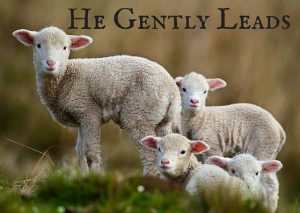 The staff is also used to gently guide the sheep away from danger and onto paths set by the shepherd. Last week we talked about how sheep tend to stick with familiar paths, even if they become dangerous and fruitless. The shepherd uses his staff to prevent the sheep from following those unfruitful paths and guide them onto paths of safety and bounty. The shepherd would gently lay his staff alongside his sheep and with the lightest touch, ease the sheep onto the desired path. Beloved, I wonder how often we fail to recognize that continual touch of God in our lives…sometimes so soft and imperceptible that it can go unnoticed. Yet what a blessing that it is there…and that He is there…going before us, guiding our ways, and shifting the inclination of our hearts.
The staff is also used to gently guide the sheep away from danger and onto paths set by the shepherd. Last week we talked about how sheep tend to stick with familiar paths, even if they become dangerous and fruitless. The shepherd uses his staff to prevent the sheep from following those unfruitful paths and guide them onto paths of safety and bounty. The shepherd would gently lay his staff alongside his sheep and with the lightest touch, ease the sheep onto the desired path. Beloved, I wonder how often we fail to recognize that continual touch of God in our lives…sometimes so soft and imperceptible that it can go unnoticed. Yet what a blessing that it is there…and that He is there…going before us, guiding our ways, and shifting the inclination of our hearts.
Continuing on in Psalm 23, we read, “You prepare a table before me in the presence of my enemies” As the shepherd leads the sheep up the mountain valleys and ravines, he will leave the sheep on occasion to check out and prepare the higher meadows to which they journey. These meadows are not like the cultivated pastures closer to home…they require preparation. The shepherd must survey the meadows to determine if they are safe. He must clear debris from the springs or creeks that run through them. He must ensure that the meadows contain good forage, suitable for grazing. If any noxious weeds are present, the shepherd diligently uproots them and carries them out of reach of the sheep. The shepherd walks the meadows looking for signs of nearby predators so that safeguards can be set if necessary. He will determine the best locations to set up the camps and set out salt licks in appropriate spots. All this is done in view of the predators that likely exist in the hills above. Only when all is prepared does the shepherd bring the sheep to the “table”…the meadows…prepared for them. The wild meadows have now been tamed by the concerted efforts of the shepherd. Meadows have been cleared, springs have been cleaned and prepared close to camp, and safe perimeters have been set.
Beloved, this is a picture of how Jesus, the Great Shepherd, goes before us and prepares our way. The sheep do not know what lies at the end of the valley…they trust that their shepherd does. They are dependent upon the shepherd to go before them and to ensure all is ready. Jesus makes provision for us as we walk through this life, and as we enter the next. He makes this clear as we read His words in John 14. Speaking to the disciples, who are trying to make sense out of Jesus talk of leaving them and worried about the next stages in their lives, He says,
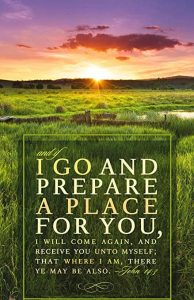 In My Father’s house are many dwelling places; if it were not so, I would have told you; for I go to prepare a place for you. If I go and prepare a place for you, I will come again and receive you to Myself, that where I am, you may be also, And you know the way where I am going.”
In My Father’s house are many dwelling places; if it were not so, I would have told you; for I go to prepare a place for you. If I go and prepare a place for you, I will come again and receive you to Myself, that where I am, you may be also, And you know the way where I am going.”
Just a few verses later, Jesus says, “I will ask the Father, and He will give you another Helper, that He may be with you forever; the Spirit of truth, whom the world cannot receive, because it does not see Him or know Him, but you know Him because He abides with you and will be in you… But the Helper, the Holy Spirit, whom the Father will send in My name, He will teach you all things, and bring to your remembrance all that I said to you.”
You see, beloved, Jesus is constantly preparing a place for us, whether it is preparing the path ahead of us as we walk through this world, or preparing Sep 2 a dwelling place for us as we enter the next. It is hard for me to leave this imagery of Jesus preparing a way for us because it is so rich and comforting, but we have a few more verses to look at before the end of our time together this evening.
The next passage says, “You have anointed my head with oil; my cup overflows.” Often, when the sheep are in the high meadows during late summer and fall, they can be besieged with flies and gnats. The shepherd would apply oil to the head and around the eyes of the sheep to drive these pests away. It is merely one more way that the shepherd provides for the comfort of the sheep. But the imagery of anointing the head with oil in this passage goes well beyond that of a shepherd and his sheep. Anointing with oil was often used to denote a special selection or standing. David would obviously have in mind his own anointing by Samuel to mark him as the man selected by God to be king. It is also done to denote and convey favor or honor. Finally, as mentioned above, it had a medicinal use. It is likely that David had all these in mind when he writes, “You have anointed my head with oil”.
The shepherd has a special relationship with his sheep. He is their caretaker…their physician. As we shall see next week, he knows them by name and they know his voice. He bestows honor and value to them as he spends himself on their behalf. He lays down his life for his sheep. Here we see a perfect picture of Jesus’ love and care for us. He is our Great Physician…our Perfect Sacrifice…our High Priest…our Great Shepherd.
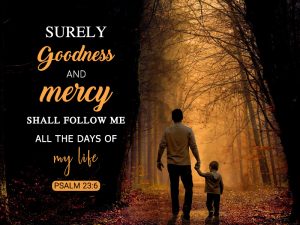 At this point in the Psalm, the Psalmist is looking ahead to the next verse…the culmination and crescendo of the entire psalm. There we read, “Surely goodness and loving kindness will follow me all the days of my life, And I will dwell in the house of the LORD forever.” In the same way that the statement, “The Lord is my shepherd; I shall not want” encompasses everything in the psalm that follows, the last verse encompasses everything that precedes. The Great Shepherd’s love and care for his sheep is abundant and overflowing…it is apparent that the shepherd loves his sheep as he goes through hardship and deprivation on their behalf in seeking to meet their needs. It is enduring…we read, ”Surely goodness and mercy will follow me all the days of my life”. It is intimate and personal… we will ”dwell in the house of the Lord.” And it is everlasting…we will dwell in the house of the Lord “forever”.
At this point in the Psalm, the Psalmist is looking ahead to the next verse…the culmination and crescendo of the entire psalm. There we read, “Surely goodness and loving kindness will follow me all the days of my life, And I will dwell in the house of the LORD forever.” In the same way that the statement, “The Lord is my shepherd; I shall not want” encompasses everything in the psalm that follows, the last verse encompasses everything that precedes. The Great Shepherd’s love and care for his sheep is abundant and overflowing…it is apparent that the shepherd loves his sheep as he goes through hardship and deprivation on their behalf in seeking to meet their needs. It is enduring…we read, ”Surely goodness and mercy will follow me all the days of my life”. It is intimate and personal… we will ”dwell in the house of the Lord.” And it is everlasting…we will dwell in the house of the Lord “forever”.
Beloved, isn’t Jesus a shepherd worthy of following? And following joyfully, not grudgingly? Let us come before Him this evening with thankful hearts for His love and care for us…that He goes before us and guides us in “paths of righteousness”…that He laid down His life on our behalf. Let us pray.
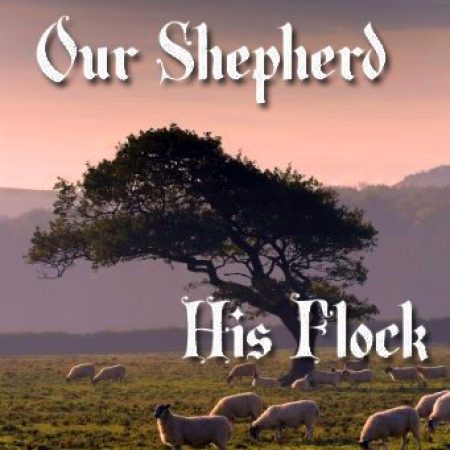

0 Comments